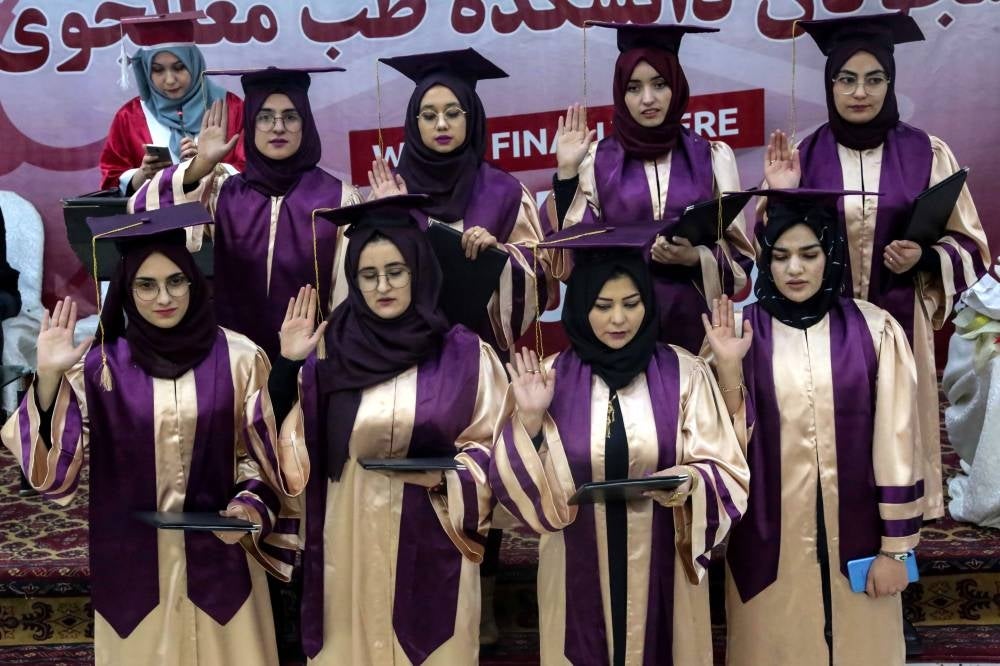Taliban 2.0: A rule of restrictions and violations of female life
MUKUL SHARMA13 Jan 2023 12:21am

Afghan girls from a private university celebrate their graduation in Kabul, Afghanistan, 04 January 2023. A group of 24 male and nine female students at a private university were graduated from the Faculty of Medicine on 04 January. The ruling Taliban has banned women from attending university in Afghanistan, according to an order issued on 20 December 2022. - EPA
From bans on education to employment including, alarmingly, qualified doctors being denied jobs in an already strained healthcare system on the brink of collapse due to shortage of staff, the Taliban remain oblivious to worldwide protests on such extreme human rights violations. Add to that the ban on male doctors treating female patients, and a health crisis among women seems impending.
South Asia-based news portal WIOnews journalist Mukul Sharma, in an exclusive aired today, discovered just how grave the situation has become.
A doctor, quoted as Dr Sona (last name withheld) revealed she is fighting depression, being among millions of Afghan women who can no longer work in Taliban-ruled Afghanistan despite securing a job in a Kabul clinic just last month.
"You cannot join because of the new rules," Dr Sona was told recently when she called the clinic for final confirmation of her employment status. This was right before the Taliban government's new ruling that directed hospitals to ensure that male doctors are no longer allowed to treat female patients. "I desperately needed that job," Dr Sona told WION in a phone conversation. "I want to tell the world that please support us. We want to be out of this misery," Dr Sona said when asked of how she expected the world to respond to the Taliban.
Despite widespread global outcry on the Taliban's rulings targeting education and employment rights of women and young girls, there has been little to no impact in reversing the extremist rulings. The UN Security Council expressed last week that it was "deeply alarmed" at erosion of women's rights in the country.
It urged the Taliban "to reopen schools and swiftly reverse these policies and practices, which represents an increasing erosion for the respect of human rights and fundamental freedoms."
The Group of Seven (G-7) countries, too, have called upon the Taliban to 'urgently reverse' ban on women aid workers.
But in Kabul's rearranged power corridors, women have been pushed to the margin, almost as a means of assertion of administrative authority of Afghanistan's new hardline rulers. "God willing, I pray that things become as they were before them (Taliban).
But I don't know if I should hope that much or not," Dr Sona said. "I dream of going to University every night"
For Bahisht, 21, becoming a doctor was a dream that she lived each day when she went to a Kabul university to study medicine.
"Ever since the university has closed, every night I dream of going to university," Bahisht told WION in a phone conversation from Kabul.
Born in Kandahar, the birthplace of the Taliban movement, Bahisht moved to Kabul with her family 12 years ago.
"I had so many dreams, I wanted to appear for USMLE (United States Medical Licensing Examination). My family did not have the financial means to make me study abroad. But I knew that if I worked hard, I would be able to live my dreams," Bahisht said.
Last month, the Taliban operatives literally shut the door of the University on Bahisht's face. Bahisht said that she made it a point to enter the university premises early in the morning.
"I was the first one to enter the gates. I started studying whatever I could for the exam that was scheduled," she said.
A couple of hours later, amid huge commotion by Bahisht's fellow university mates also attempting to enter the university, she was the only student inside.
"They (Taliban operatives) were shocked when they realised I was inside. They didn't know I had come early on," Bahisht said. "Get out. From today on, the university is closed for you forever," Bahisht was told by Taliban operatives as she was pushed out of the university gates.
"The Taliban surrounded our University to ensure that not one girl could enter. It was as if we were the terrorists and they were present there to apprehend us. The Talibs were all over the police jeeps," Bahisht said.
In the visuals seen by WION, men mounted on a police jeep surround the bus of the university in which Bahisht studied. The men could be seen holding barricades and weapons, exactly the way Bahisht explained.
"They took away everything from us. Our freedom, our happiness. It was just the education that we were left with. They took that away as well," Bahisht said. In a critically-acclaimed biographical account of late Afghan politician and military commander Ahmad Shah Massoud, Scottish journalist Sandy Gall – in a chapter titled ‘Marriage and War’ – quotes a close aide of Massoud as saying: "When you respect people's dignity, they join your side." Afghanistan’s female medical professionals and students expect that erosion of their dignity under Taliban will result in the downfall of the country's current rulers.
“If women are sick now, they can no longer visit the male doctors. Like that the women will die for the lack of medical supervision,” Bahisht said. “Women can no longer be the sick ones; the patients in Afghanistan. Let alone doctors.” - WIOnews













